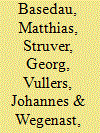|
|
|
Sort Order |
|
|
|
Items / Page
|
|
|
|
|
|
|
| Srl | Item |
| 1 |
ID:
109142


|
|
|
|
|
| Publication |
2011.
|
| Summary/Abstract |
Theoretically, the "mobilization hypothesis" establishes a link between religion and conflict by arguing that particular religious structures are prone to mobilization; once politicized, escalation to violent conflict becomes more likely. Yet, despite the religious diversity in sub-Saharan Africa and the religious overtones in a number of African conflicts, this assumption has not yet been backed by systematic empirical research on the religion-conflict nexus in the region. The following questions thus remain: Do religious factors significantly impact the onset of (religious) armed conflict? If so, do they follow the logic of the mobilization hypothesis and, if so, in which way? To answer these questions, this article draws on a unique data inventory of all sub-Saharan countries for the period 1990-2008, particularly including data on mobilization-prone religious structures (e.g., demographic changes, parallel ethno-religious identities) as well as religious factors indicating actual politicization of religion (e.g., inter-religious tensions, religious discrimination, incitement by religious leaders). Logit regressions suggest that religion indeed plays a significant role in African armed conflicts. These findings are compatible with the mobilization hypothesis, and stress the impact of conflict-prone religious structures, and particularly, the fact that overlaps of religious and ethnic identities are conflict-prone. Future research should investigate the religion-ethnicity-nexus in more detail.
|
|
|
|
|
|
|
|
|
|
|
|
|
|
|
|
| 2 |
ID:
158848


|
|
|
|
|
| Summary/Abstract |
According to conventional wisdom, strategic natural resources like oil are harmful to international peace. Nonetheless, there is little comparative work on the link between resources and interstate conflicts. Analyzing the impact of oil on militarized interstate disputes on the dyadic level of analysis for the period from 1946 to 2001, this paper shows that oil in fact influences the conflict potential between countries. Results of logistic regressions suggest that absolute oil abundance as well as oil dependence increase the risk of dispute involvement. We find that in particular oil production, oil reserves, oil dependence, and oil exports are associated with a higher risk of initiating conflict while countries enjoying large oil reserves are more frequently the target of military actions. Furthermore, our analysis indicates that the presence of large oil deposits also increase the intensity of international disputes. Relative measures of oil abundance such as per capita oil production, in contrast, do not affect countries’ dispute proneness. Increased militarization, the internationalization of intrastate violence, the indulgence of an oil-dependent world community and so-called “classical resource wars”—rather than domestic political mechanisms inherent to the rentier state—are likely to explain our findings.
|
|
|
|
|
|
|
|
|
|
|
|
|
|
|
|
| 3 |
ID:
173887


|
|
|
|
|
| Summary/Abstract |
A large body of research indicates that environmental conditions can influence the risk of social unrest. However, we know little about how these effects may change in the long run. Are they likely to remain constant or do they change over time – for example as a consequence of human adaptation? To investigate this question, we rely on a disaggregated analysis of England over a period of more than 300 years. Combining data on geo-referenced food riots with reconstructed climate data, we first assess the impact of annual temperatures on social unrest over the period 1500–1817. We then use our long-term time-series dataset to assess the temporal heterogeneity of year-to-year associations between temperatures and social conflict. Our models show a substantive negative correlation between temperatures and food riots in the aggregate. This association, however, seems to be highly inconsistent over time and largely confined to the 18th century. In addition, we find evidence of decadal processes of adaptation: past exposure to adverse weather conditions dampens the effect of current exposure. Taken together, these findings underline the importance of considering temporal heterogeneities when assessing the climate–conflict nexus and caution against any simple extrapolations of observable present-day effects of environmental conditions into the future.
|
|
|
|
|
|
|
|
|
|
|
|
|
|
|
|
|
|
|
|
|